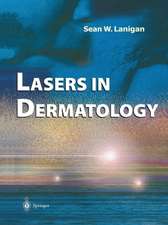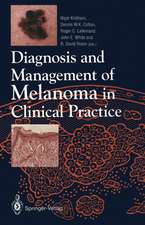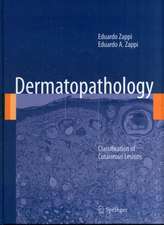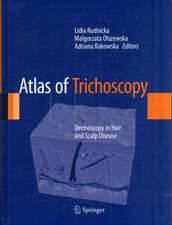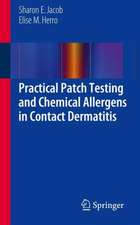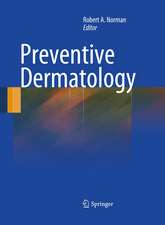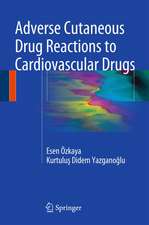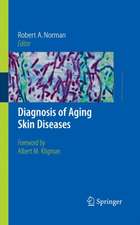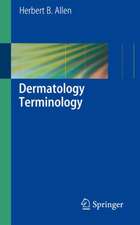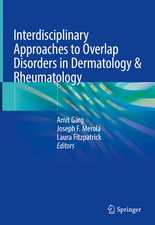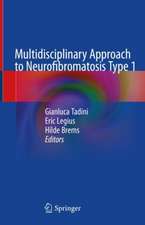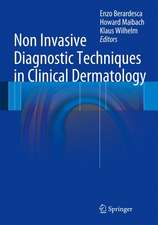The Etiology of Atopic Dermatitis
Autor Herbert B. Allenen Limba Engleză Paperback – 24 sep 2016
| Toate formatele și edițiile | Preț | Express |
|---|---|---|
| Paperback (1) | 449.45 lei 38-44 zile | |
| SPRINGER LONDON – 24 sep 2016 | 449.45 lei 38-44 zile | |
| Hardback (1) | 712.60 lei 3-5 săpt. | |
| SPRINGER LONDON – 12 ian 2015 | 712.60 lei 3-5 săpt. |
Preț: 449.45 lei
Preț vechi: 473.11 lei
-5% Nou
Puncte Express: 674
Preț estimativ în valută:
86.03€ • 93.48$ • 72.31£
86.03€ • 93.48$ • 72.31£
Carte tipărită la comandă
Livrare economică 18-24 aprilie
Preluare comenzi: 021 569.72.76
Specificații
ISBN-13: 9781447172550
ISBN-10: 1447172558
Pagini: 135
Ilustrații: XVIII, 117 p. 111 illus., 108 illus. in color.
Dimensiuni: 155 x 235 mm
Ediția:Softcover reprint of the original 1st ed. 2015
Editura: SPRINGER LONDON
Colecția Springer
Locul publicării:London, United Kingdom
ISBN-10: 1447172558
Pagini: 135
Ilustrații: XVIII, 117 p. 111 illus., 108 illus. in color.
Dimensiuni: 155 x 235 mm
Ediția:Softcover reprint of the original 1st ed. 2015
Editura: SPRINGER LONDON
Colecția Springer
Locul publicării:London, United Kingdom
Cuprins
Clinical presentations.- Microbiology.- Pathology.- Immunology.- Genetics.- Physiology.- Treatment.- Diseases in which eczema is a secondary component (Meyerson’s nevus and Doucas Kapetanakis pigmented purpuric dermatosis).- Diseases with occluded sweat ducts other than eczema (tinea pedis, axillary granular parakeratosis, seborrheic dermatitis).- The Story of Eczema in Pictures.- Epilogue: A comparison of psoriasis and eczema: both caused by bacteria, but neither an infection.
Recenzii
“The purpose is to present the biofilm bacterialocclusion theory as the inciting inflammatory immune event leading to eczema.The audience is all primary physicians and dermatologists.” (Patricia Wong,Doody’s Book Reviews, November, 2015)
Notă biografică
Dr. Allen is a graduate of Johns Hopkins University School of Medicine. He has served on the boards of the American Society of Dermatology and the American College of Physicians and has published over 40 scientific articles in the fields of dermatology and dermatopathology. For the past ten years, he has been the Professor and Chair of the Department of Dermatology of Drexel University College of Medicine. Dr. Herbert B. Allen’s specialties include dermatology and dermatopathology, skin pathology and fungal infections and is board-certified with the American Board of Dermatology and the American Board of Pathology.
Textul de pe ultima copertă
Atopic dermatitis has been called “the itch that rashes”, and this book reveals what causes the “itch”. It presents completely new and unique findings in eczema: sweat ducts that become occluded with staphylococcal biofilms trigger the innate immune system with TLR2 receptor activity and this leads to production of the “itching” and inflammation in this disease.
The Etiology ofAtopic Dermatitis details new concepts that bacterial biofilms occlude sweat ducts, trigger the innate immune system, and produce the lesions in atopic dermatitis. The author discusses the findings in terms of microbiology, pathology, immunology, genetics, physiology, treatment, diseases where eczema is considered a secondary component, and diseases not previously thought to be eczema, and followed by an epilogue where eczema and psoriasis are compared. Both these diseases are caused by bacteria, but neither one can be considered an infection. As such, this book is for all who take care of patients with atopic dermatitis, including dermatologists, pediatricians, family practice doctors, allergists and pathologists. It will also be interesting for those involved in research in microbiology, physiology, immunology, and genetics.
The Etiology ofAtopic Dermatitis details new concepts that bacterial biofilms occlude sweat ducts, trigger the innate immune system, and produce the lesions in atopic dermatitis. The author discusses the findings in terms of microbiology, pathology, immunology, genetics, physiology, treatment, diseases where eczema is considered a secondary component, and diseases not previously thought to be eczema, and followed by an epilogue where eczema and psoriasis are compared. Both these diseases are caused by bacteria, but neither one can be considered an infection. As such, this book is for all who take care of patients with atopic dermatitis, including dermatologists, pediatricians, family practice doctors, allergists and pathologists. It will also be interesting for those involved in research in microbiology, physiology, immunology, and genetics.
Caracteristici
Highly illustrated diagnostic review of atopic dermatitis Concise approach with the emphasis on immediate application of knowledge Presents key concepts in an easy understandable format

